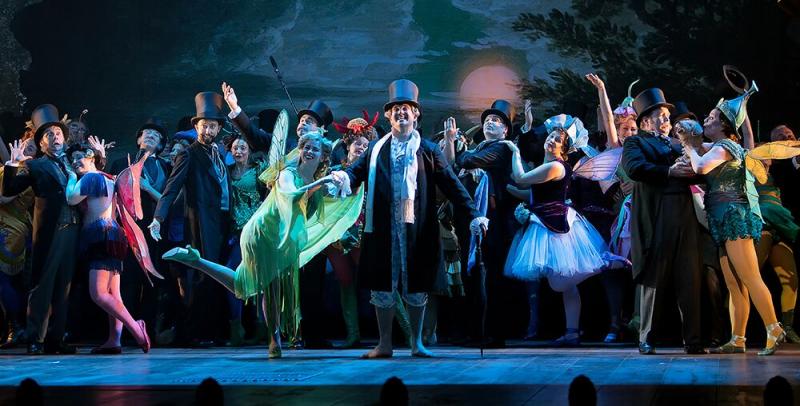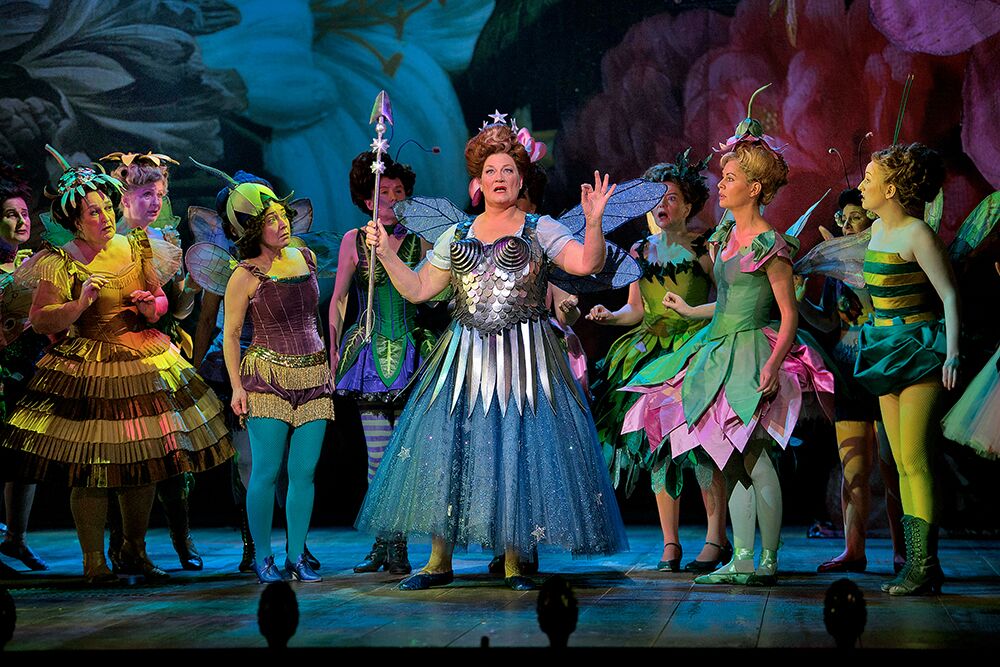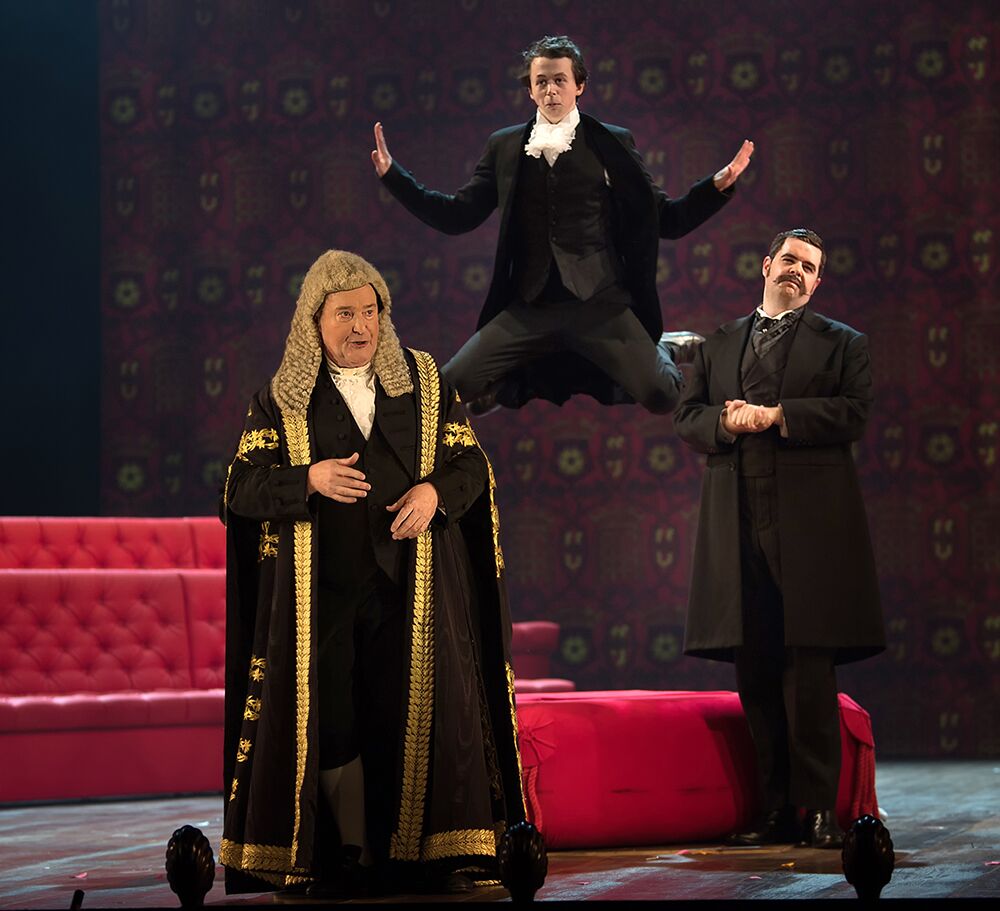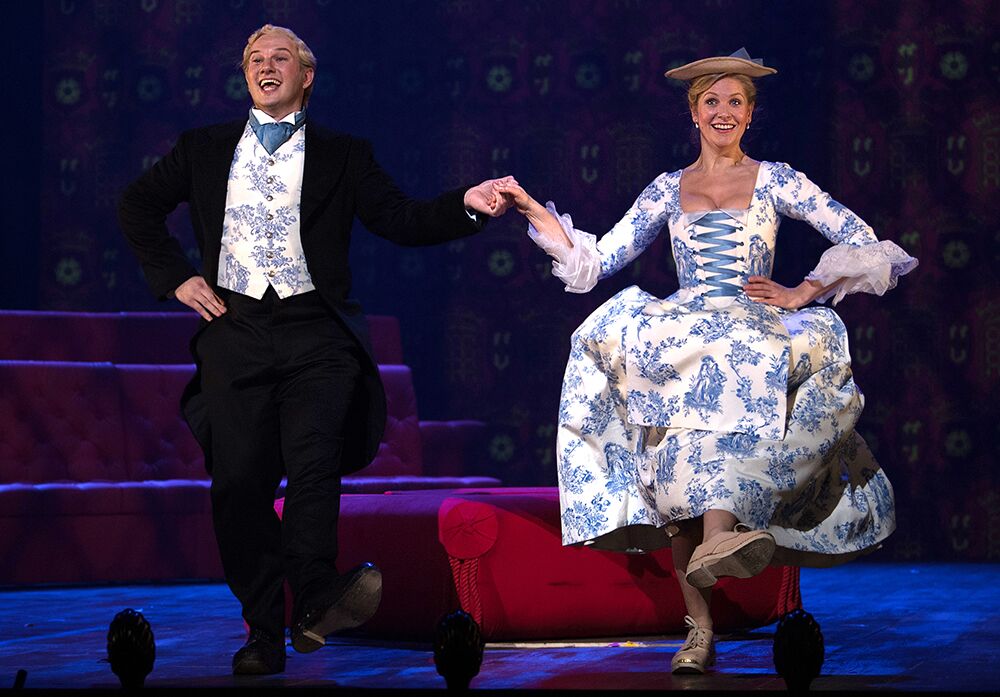Iolanthe, English National Opera review - bright and beautiful G&S for all | reviews, news & interviews
Iolanthe, English National Opera review - bright and beautiful G&S for all
Iolanthe, English National Opera review - bright and beautiful G&S for all
Cal McCrystal's pretty, hilarious show should delight young and old alike

Very well, so ENO's latest Gilbert and Sullivan spectacular was originally to have been The Gondoliers directed by Richard Jones and conducted by Mark Wigglesworth.
He does, and in a way that should please absolutely everyone, given a cast that responds unanimously to his baroque invention. If you're not crying with laughter midway through the second act, visit your GP. The worry was that where Mike Leigh had respected his material in The Pirates of Penzance at ENO, the One Man, Two Guvnors prankster would over-egg the confection. As it turns out, though, McCrystal never oversteps the line, even if he approaches it in a spun-out gag with sheep manoeuvres during Dresden shepherd Strephon and shepherdess Phyllis’s pretty love-duet (animals regularly steal the scene here). Generally, though, all the extras simply turn the comic screw further. And the instinct for what’s kept the Savoy Operas evergreen is complemented by a bewitching final set-and-costumes fling from the late, lamented Paul Brown, unquestionably a visual genius of the operatic stage. Tim Mitchell's lighting does it incandescent justice. This awe-inspiring visual tour-de-force comes close to the opulence of Brown’s chrysanths-under-glass Pelléas et Mélisande for Graham Vick at Glyndebourne, but the Victorian toy-theatre Palace of Varieties is in earnest, not in its decadence like the Edwardian castle of Debussy and Maeterlinck's Allemonde. Giant blooms and fantastical flower-fairy costumes (Yvonne Howard's Queen and attendant fairies pictured above) wing out and are replaced by a Claude-esque landscape with even lovelier bosky groves painted on flats for Arcadia, temporarily wrecked by a lavish production coup as the Peers tantantarara in to let off Industrial-Revolution steam and rural slaughter; House of Lords in Act Two is just as much of a visual treat. Expensive, surely, and it would sit well in any West End theatre.
This awe-inspiring visual tour-de-force comes close to the opulence of Brown’s chrysanths-under-glass Pelléas et Mélisande for Graham Vick at Glyndebourne, but the Victorian toy-theatre Palace of Varieties is in earnest, not in its decadence like the Edwardian castle of Debussy and Maeterlinck's Allemonde. Giant blooms and fantastical flower-fairy costumes (Yvonne Howard's Queen and attendant fairies pictured above) wing out and are replaced by a Claude-esque landscape with even lovelier bosky groves painted on flats for Arcadia, temporarily wrecked by a lavish production coup as the Peers tantantarara in to let off Industrial-Revolution steam and rural slaughter; House of Lords in Act Two is just as much of a visual treat. Expensive, surely, and it would sit well in any West End theatre.
As would the dramatic and vocal teamwork, which deserves an extended run. Under the eagle eye of conductor Timothy Henty, for whom the ENO Orchestra on first night was a little less razor-sharp than the singers, at least in the most bewitching of all Sullivan overtures, they deliver the goods with unstinting energy. For the chorus there’s too much to do to ever lose focus. Lizzie Gee’s resourceful dance routines are familiar from her work on Sasha Regan’s all-male HMS Pinafore and The Pirates of Penzance; they somehow trip the fine line between chorus-number show-offiness and the real magic needed for these sometimes heavy-footed fairies – gags built in to the music. McCrystal’s layering gives us multiple variations on the chorene out of step and a raunchy part for the usually overshadowed third fairy Fleta, Flick Ferdinando delivering Toby Davies’s judiciously timed extra material with gusto.  Of the two other extras, Clive Mantle’s Captain Shaw doubles as warm-up artist and explanation for the Fairy Queen’s wish that “thy brigade, with cold cascade, quench my great love” for Private Willis (the original head of the Metropolitan Fire Brigade was in the first-night audience). Mantle gets his laughs, but the star in that department is funny face and flexible body Richard Leeming as the Lord Chancellor’s Page. To enrich the tradition whereby a G&S Act Two trio gets its encores, McCrystal turns it into a quartet with Leeming as fall guy (pictured above with Andrew Shore and Ben McAteer).
Of the two other extras, Clive Mantle’s Captain Shaw doubles as warm-up artist and explanation for the Fairy Queen’s wish that “thy brigade, with cold cascade, quench my great love” for Private Willis (the original head of the Metropolitan Fire Brigade was in the first-night audience). Mantle gets his laughs, but the star in that department is funny face and flexible body Richard Leeming as the Lord Chancellor’s Page. To enrich the tradition whereby a G&S Act Two trio gets its encores, McCrystal turns it into a quartet with Leeming as fall guy (pictured above with Andrew Shore and Ben McAteer).
Not that the singers are overshadowed. Marcus Farnsworth’s energetic but focused Strephon and Ellie Laugharne’s feisty Phyllis follow that with a brilliant tap number (pictured below); the rival Earls Tolloller and Mountararat, tenor Ben Johnson and baritone Ben McAteer, sing just as beautifully and act out their more-than-bromance, public-school style, deliciously. Let's just say it doesn't need a plot device to bring out their inner fairies. Barnaby Rea has the right poise, too, on belated sentry duty. Yvonne Howard is a commanding, impressively chest-voiced but unusually attractive Fairy Queen, and though Andrew Shore's Lord Chancellor began last night wrong-footed by the text, his usual comic authority shone in a Nightmare Song all the better for being taken at a steady pace, not just showily pattered, the more to underline the brilliant lyrics and Sullivan’s sly touches in the orchestration.  The scene with his long-lost, eponymous fairy wife (Samantha Price) was perhaps not quite as moving as it had been in the all-male Iolanthe at Wilton’s Music Hall. But there’s no disguising the fact that the instrumentation adds layers of beauty and sophistication you can never get with mere piano accompaniment, however inventive a fringe show. Both quaint and timeless, the essential innocence is respected despite the earthy trimmings, and topical references for a Parliament which was, of course, only Tories and Whigs at the time of composition are kept to a minimum (though a flaxen mophead does bumble through on a bicycle and one of his partners in crime is also among the Lords). This is a production that equals in its visual pleasures what you hear. Unmodified rapture, then, and one to see two or three times; take a child of seven upwards and an aged relative, they ought to love it equally.
The scene with his long-lost, eponymous fairy wife (Samantha Price) was perhaps not quite as moving as it had been in the all-male Iolanthe at Wilton’s Music Hall. But there’s no disguising the fact that the instrumentation adds layers of beauty and sophistication you can never get with mere piano accompaniment, however inventive a fringe show. Both quaint and timeless, the essential innocence is respected despite the earthy trimmings, and topical references for a Parliament which was, of course, only Tories and Whigs at the time of composition are kept to a minimum (though a flaxen mophead does bumble through on a bicycle and one of his partners in crime is also among the Lords). This is a production that equals in its visual pleasures what you hear. Unmodified rapture, then, and one to see two or three times; take a child of seven upwards and an aged relative, they ought to love it equally.
rating
Explore topics
Share this article
Add comment
The future of Arts Journalism
You can stop theartsdesk.com closing!
We urgently need financing to survive. Our fundraising drive has thus far raised £49,000 but we need to reach £100,000 or we will be forced to close. Please contribute here: https://gofund.me/c3f6033d
And if you can forward this information to anyone who might assist, we’d be grateful.

Subscribe to theartsdesk.com
Thank you for continuing to read our work on theartsdesk.com. For unlimited access to every article in its entirety, including our archive of more than 15,000 pieces, we're asking for £5 per month or £40 per year. We feel it's a very good deal, and hope you do too.
To take a subscription now simply click here.
And if you're looking for that extra gift for a friend or family member, why not treat them to a theartsdesk.com gift subscription?
more Opera
 La bohème, Opera North review - still young at 32
Love and separation, ecstasy and heartbreak, in masterfully updated Puccini
La bohème, Opera North review - still young at 32
Love and separation, ecstasy and heartbreak, in masterfully updated Puccini
 Albert Herring, English National Opera review - a great comedy with depths fully realised
Britten’s delight was never made for the Coliseum, but it works on its first outing there
Albert Herring, English National Opera review - a great comedy with depths fully realised
Britten’s delight was never made for the Coliseum, but it works on its first outing there
 Carmen, English National Opera review - not quite dangerous
Hopes for Niamh O’Sullivan only partly fulfilled, though much good singing throughout
Carmen, English National Opera review - not quite dangerous
Hopes for Niamh O’Sullivan only partly fulfilled, though much good singing throughout
 Giustino, Linbury Theatre review - a stylish account of a slight opera
Gods, mortals and monsters do battle in Handel's charming drama
Giustino, Linbury Theatre review - a stylish account of a slight opera
Gods, mortals and monsters do battle in Handel's charming drama
 Susanna, Opera North review - hybrid staging of a Handel oratorio
Dance and signing complement outstanding singing in a story of virtue rewarded
Susanna, Opera North review - hybrid staging of a Handel oratorio
Dance and signing complement outstanding singing in a story of virtue rewarded
 Ariodante, Opéra Garnier, Paris review - a blast of Baroque beauty
A near-perfect night at the opera
Ariodante, Opéra Garnier, Paris review - a blast of Baroque beauty
A near-perfect night at the opera
 Cinderella/La Cenerentola, English National Opera review - the truth behind the tinsel
Appealing performances cut through hyperactive stagecraft
Cinderella/La Cenerentola, English National Opera review - the truth behind the tinsel
Appealing performances cut through hyperactive stagecraft
 Tosca, Royal Opera review - Ailyn Pérez steps in as the most vivid of divas
Jakub Hrůša’s multicoloured Puccini last night found a soprano to match
Tosca, Royal Opera review - Ailyn Pérez steps in as the most vivid of divas
Jakub Hrůša’s multicoloured Puccini last night found a soprano to match
 Tosca, Welsh National Opera review - a great company reduced to brilliance
The old warhorse made special by the basics
Tosca, Welsh National Opera review - a great company reduced to brilliance
The old warhorse made special by the basics
 BBC Proms: The Marriage of Figaro, Glyndebourne Festival review - merriment and menace
Strong Proms transfer for a robust and affecting show
BBC Proms: The Marriage of Figaro, Glyndebourne Festival review - merriment and menace
Strong Proms transfer for a robust and affecting show
 BBC Proms: Suor Angelica, LSO, Pappano review - earthly passion, heavenly grief
A Sister to remember blesses Puccini's convent tragedy
BBC Proms: Suor Angelica, LSO, Pappano review - earthly passion, heavenly grief
A Sister to remember blesses Puccini's convent tragedy
 Orpheus and Eurydice, Opera Queensland/SCO, Edinburgh International Festival 2025 review - dazzling, but distracting
Eye-popping acrobatics don’t always assist in Gluck’s quest for operatic truth
Orpheus and Eurydice, Opera Queensland/SCO, Edinburgh International Festival 2025 review - dazzling, but distracting
Eye-popping acrobatics don’t always assist in Gluck’s quest for operatic truth

Comments
David, the G&S which Kleiber
And my source said The
And my source said The Gondoliers. Which, for the first paragraph's sake (si non e vero, e ben trovato), I'd like to have kept. But since Jonas is quoted in the Kleiber book, I'll remove that.
Have sat through the
And with the heart that was
And with the heart that was missing from Barrie Kosky's half-wonderful (for me) show.
I attended the performance of
I can see why the expectation
I can see why the expectation was that everyone would understand the spoken dialogue - you don't have supertitles in the theatre, after all, though not all singers are as good as actors in that respect. Certainly there's more through-composed music in Iolanthe than in most of the Savoy operas. I liked the supertitling responsibility in delaying some of the punchlines.